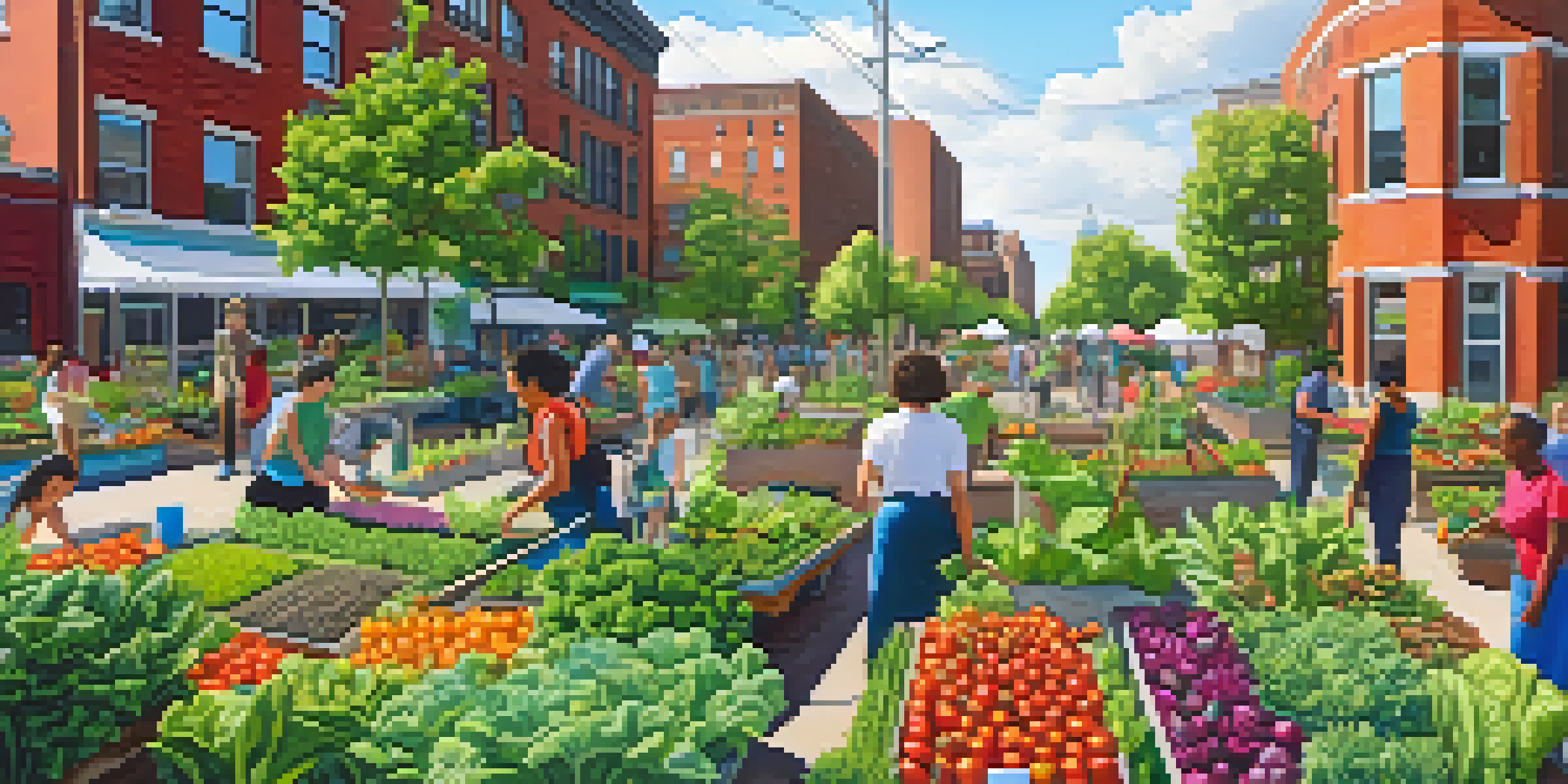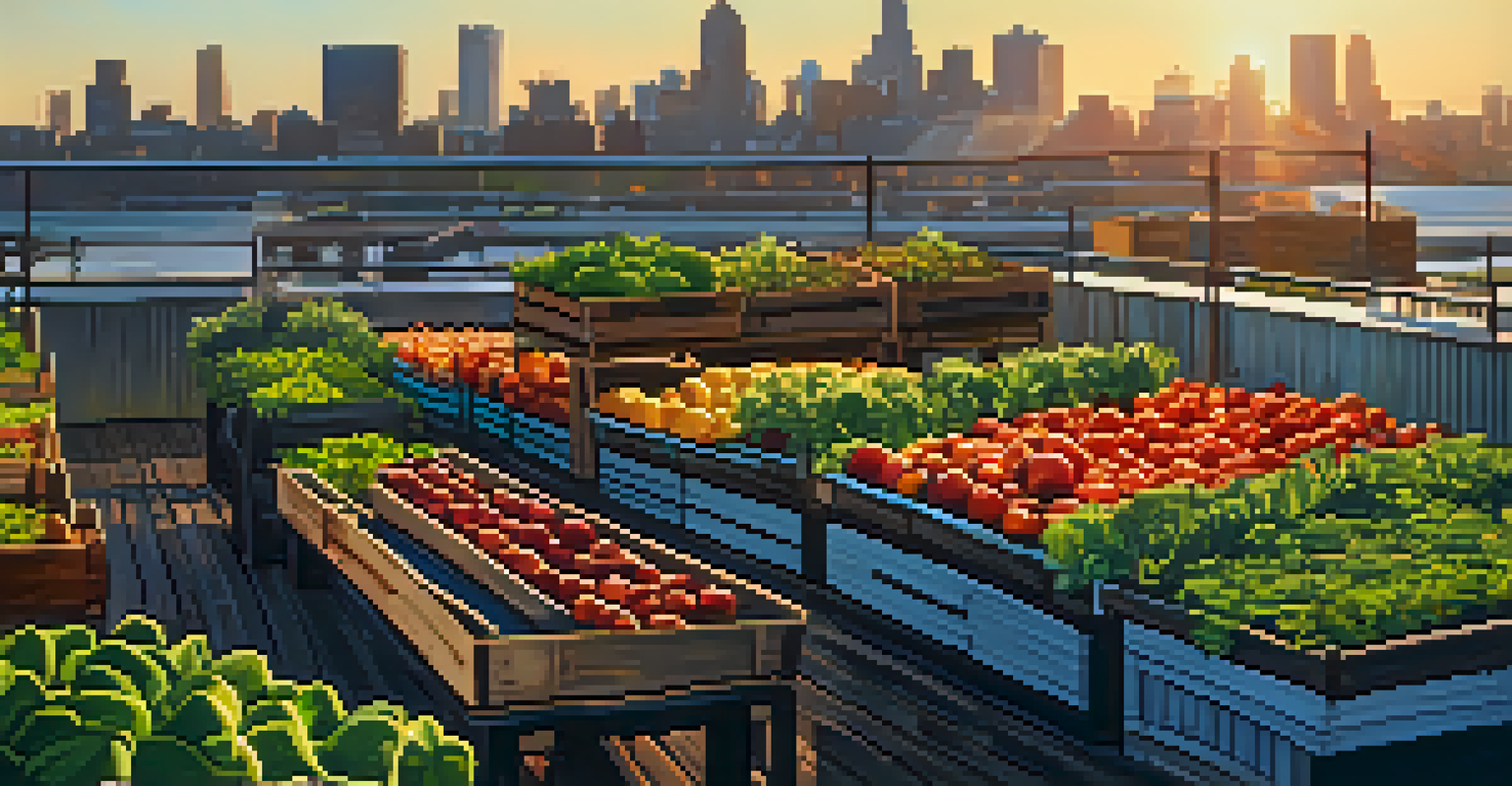Impact of Urban Agriculture on Buffalo's Food Insecurity Issues

Understanding Food Insecurity in Buffalo
Food insecurity is a significant challenge in Buffalo, affecting many residents' access to nutritious food. With a substantial portion of the population living below the poverty line, many families struggle to afford basic groceries. This situation is exacerbated by the lack of nearby grocery stores, particularly in low-income neighborhoods, making it difficult for residents to obtain fresh produce and other healthy options.
Food sovereignty is about more than just food; it's about dignity, pride, and the right to self-determination.
In Buffalo, food deserts—areas with limited access to affordable and nutritious food—are prevalent. These deserts can lead to reliance on processed foods, which contributes to health issues like obesity and diabetes. The consequences of food insecurity extend beyond physical health, impacting mental well-being and overall quality of life.
Addressing food insecurity requires innovative solutions that empower communities. Urban agriculture has emerged as a promising approach, providing fresh food sources and fostering community engagement. By transforming vacant lots and underutilized spaces into vibrant gardens, Buffalo can take significant steps toward alleviating food insecurity.
The Rise of Urban Agriculture in Buffalo
Urban agriculture has gained momentum in Buffalo, with community gardens and urban farms sprouting up across the city. These initiatives are often spearheaded by local residents and organizations eager to combat food insecurity while promoting sustainability. By reclaiming abandoned lots and utilizing rooftops, Buffalo is transforming its landscape into a source of fresh produce.

One notable example is the Massachusetts Avenue Project, which provides hands-on training in farming and nutrition. This initiative not only supplies fresh vegetables to local residents but also educates them on healthy eating practices. Such programs illustrate how urban agriculture can empower communities to take control of their food sources.
Urban Agriculture Fights Food Insecurity
Urban agriculture initiatives in Buffalo are addressing food insecurity by providing access to fresh produce and empowering communities.
Moreover, urban farms can create jobs and stimulate local economies. By offering employment opportunities and supporting local markets, these initiatives foster economic resilience in areas that need it the most. As urban agriculture continues to thrive, it plays a vital role in addressing the broader issues of food insecurity and economic disparity.
Benefits of Urban Agriculture for Communities
Urban agriculture provides numerous benefits beyond just food production. It fosters community connections by bringing neighbors together to work towards a common goal—growing food. This collaboration often leads to strengthened social ties and a sense of community ownership, which can be particularly valuable in areas facing economic challenges.
The future of our cities depends on our ability to cultivate not just food, but community.
Additionally, urban gardens promote environmental sustainability. They can help mitigate urban heat, improve air quality, and support biodiversity by providing habitats for pollinators. These green spaces not only enhance the urban landscape but also contribute to the overall health of the ecosystem.
Furthermore, community gardens often become educational hubs, offering workshops and programs focused on gardening, nutrition, and sustainability. These initiatives empower residents with knowledge and skills that can lead to healthier lifestyles and informed decisions about food. By nurturing both the mind and body, urban agriculture becomes a holistic solution to food insecurity.
Challenges Faced by Urban Farmers
While urban agriculture offers many benefits, it is not without its challenges. Land access and security are significant hurdles; many urban farmers operate on borrowed or temporary land, making long-term planning difficult. Without stable land tenure, these initiatives face uncertainty, hindering their growth and sustainability.
Moreover, urban farmers often encounter regulatory hurdles that can complicate their efforts. Zoning laws, health regulations, and bureaucratic red tape can impede the establishment of new gardens or farms. Navigating these regulations can be daunting, particularly for community-led initiatives with limited resources.
Community Engagement is Essential
Collaboration among local government, community organizations, and residents is crucial for the success and sustainability of urban farming efforts.
Additionally, funding can be a barrier. Many urban agriculture projects rely on grants and donations, which can be inconsistent. Securing financial support is crucial for maintaining operations and expanding outreach, highlighting the need for increased investment in urban farming initiatives.
Urban Agriculture and Food Sovereignty
Urban agriculture aligns closely with the concept of food sovereignty, which emphasizes the right of communities to define their own food systems. This perspective advocates for local control over food production, allowing residents to grow what they need and make choices that reflect their cultural preferences. In Buffalo, this can lead to greater food diversity and security.
By encouraging local food production, urban agriculture can reduce reliance on external food sources, which are often subject to market fluctuations and supply chain disruptions. During times of crisis, such as natural disasters or pandemics, having local food systems in place can ensure that communities remain resilient and self-sufficient.
Moreover, food sovereignty empowers marginalized communities by giving them a voice in food production. This shift allows residents to reclaim their food systems, fostering dignity and pride in their cultural food practices. As Buffalo embraces urban agriculture, it also embraces the principles of food sovereignty, creating a more equitable food landscape.
The Role of Local Government and Policy
Local government plays a crucial role in supporting urban agriculture initiatives. By implementing policies that facilitate land access, provide resources, and reduce regulatory barriers, officials can create an environment where urban farming can flourish. Supportive policies can transform Buffalo's food landscape and significantly impact food insecurity.
Moreover, local government can foster partnerships between urban farmers and community organizations. Collaborations can lead to shared resources, knowledge exchange, and increased visibility for urban agriculture projects. These partnerships can amplify the impact of individual initiatives, creating a network of support for food security efforts.
Food Sovereignty Empowers Residents
By promoting local food production, urban agriculture enhances food sovereignty, allowing communities to reclaim their food systems and cultural practices.
In addition, policies that promote community engagement and education surrounding urban agriculture can help raise awareness about food issues. By involving residents in the decision-making process, local government can ensure that initiatives align with community needs and values, ultimately leading to more successful outcomes.
The Future of Urban Agriculture in Buffalo
The future of urban agriculture in Buffalo looks promising, with growing interest and engagement from residents and organizations alike. As more people recognize the importance of local food systems, urban agriculture initiatives are likely to expand and evolve. This could lead to increased access to fresh produce, reduced food insecurity, and stronger community bonds.
Furthermore, as the city invests in green infrastructure and sustainable practices, urban agriculture can play a pivotal role in shaping a more resilient future. Integrating urban farms into city planning can enhance public spaces, improve air quality, and contribute to the overall well-being of residents. The potential for urban agriculture to transform Buffalo's landscape is immense.

Ultimately, the success of urban agriculture will depend on collaboration among stakeholders, including local government, community organizations, and residents. By working together, Buffalo can harness the power of urban agriculture to address food insecurity and build a healthier, more sustainable city for all.